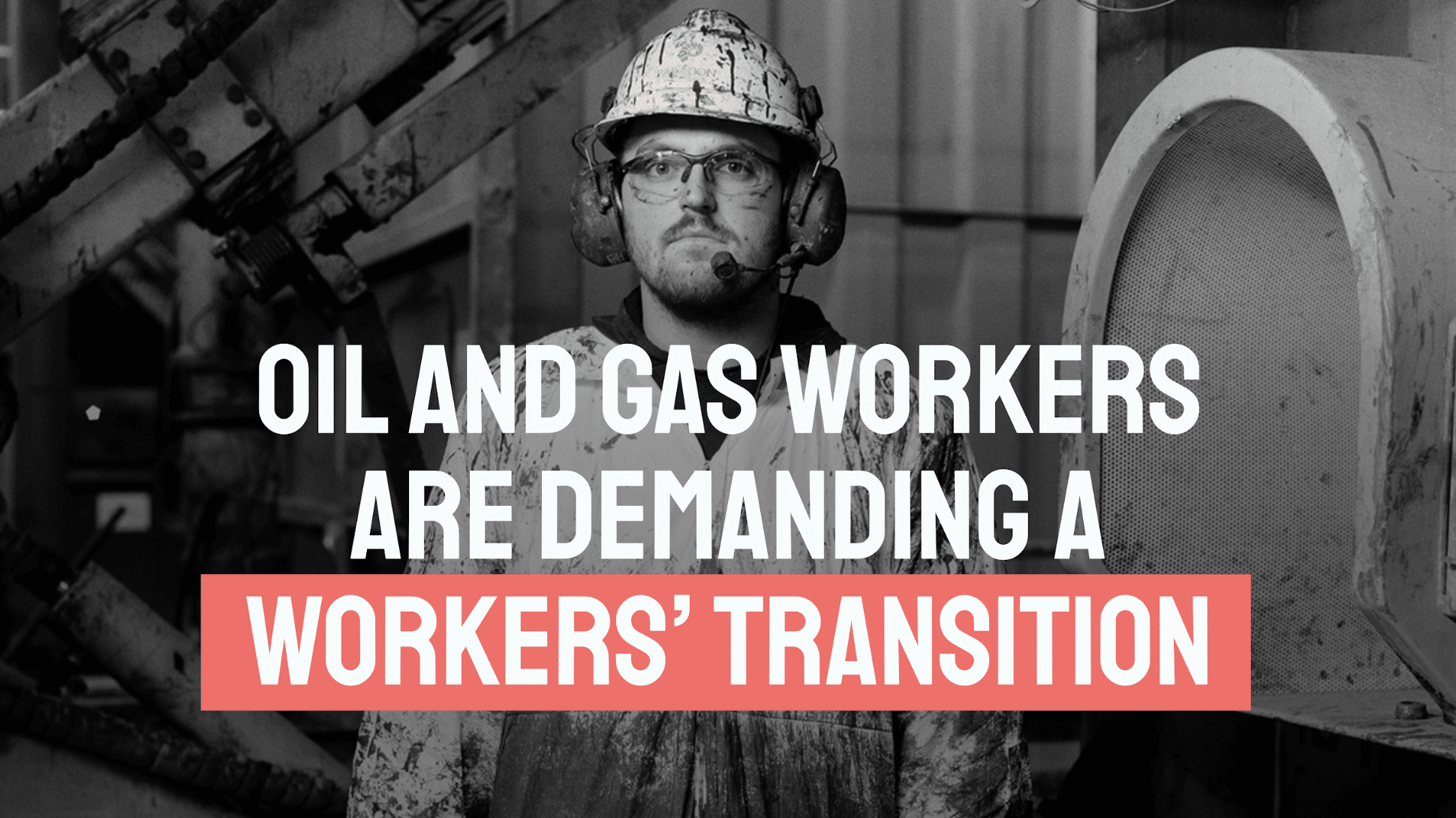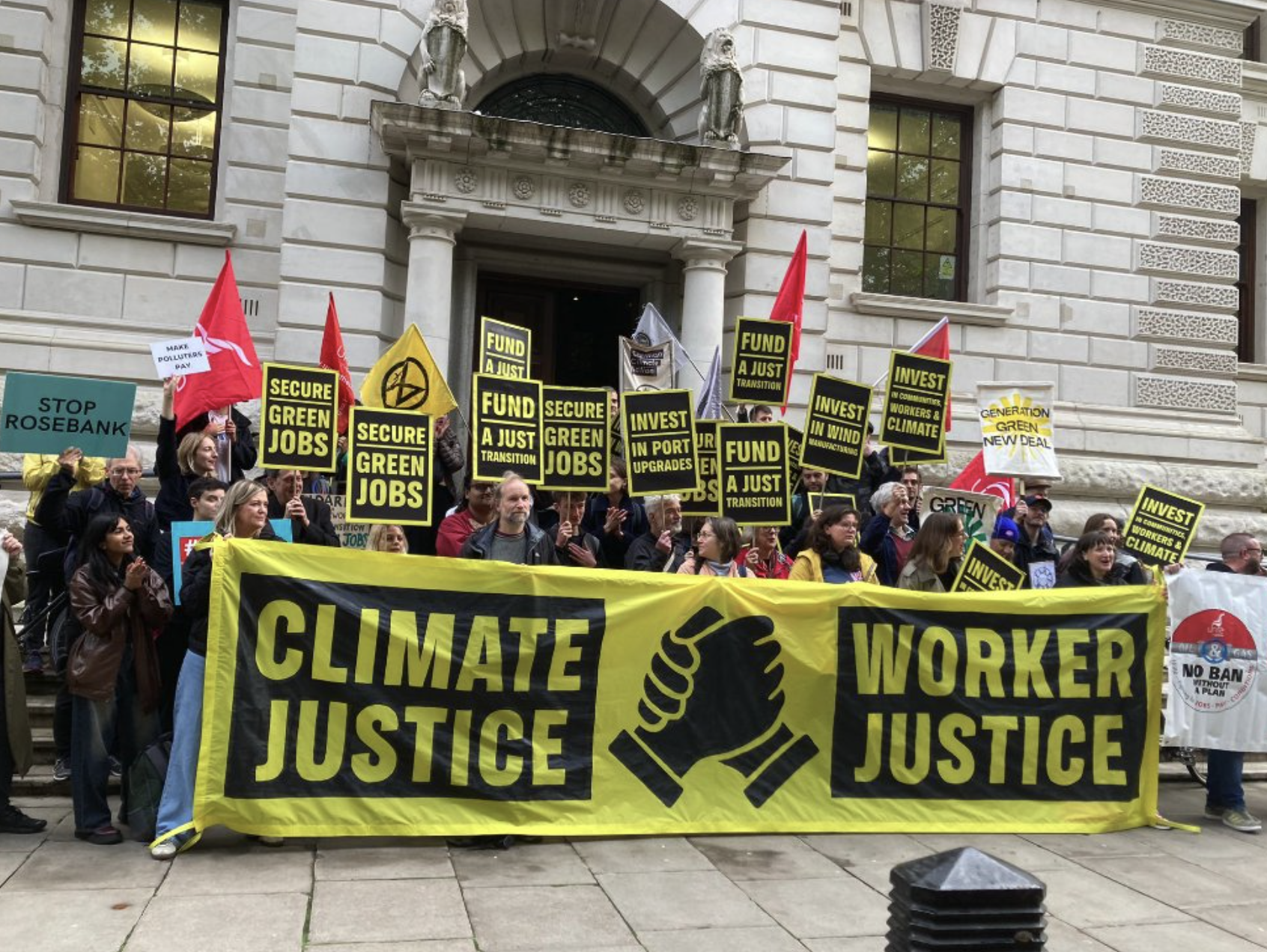New survey shows overwhelming worker demand for more government investment to support workers through the transition
- More than a quarter of North Sea oil and gas workers are looking to quit the industry, according to new research, as just 16% say they are happy in their job.
- More than half (53%) of oil and gas workers say industry conditions have worsened over the past five years despite record-breaking industry profits in this time.
- Workers want more, not less, public investment to support the creation of secure, well-paid jobs, including in domestic wind manufacturing, which 85% of workers support.
Over one quarter (27%) of oil and gas workers are actively looking to leave the industry according to a major new survey by Platform.
The new research, which assessed the views of more than 400 oil and gas workers, paints a picture of a workforce struggling with declining conditions and inadequate government support – almost all of those surveyed (95%) said that the UK government isn’t doing enough to support oil and gas workers into alternative employment, and 83% said the Scottish government isn’t.
When questioned, fewer than two in ten (16%) oil and gas workers said they are currently happy in their jobs and more than half (53%) say conditions have worsened over the past five years, including stagnant wages, despite record-breaking industry profits in this time.
Workers, who responded to the survey anonymously, described “poor morale” among the workforce, with one saying they felt workers were treated “like dirt” and “safety was suffering”. Another employee in the supply chain accused the industry of “laying us all off whilst you pay shareholders billions and give yourselves massive bonuses”. Another described how “salaries have declined and been stagnant for over a decade”, adding that “staff have taken the brunt of this” not oil company executives. A third of those surveyed live in Aberdeen.
Against a backdrop of a North Sea basin in geological decline, nearly three quarters (71%) of workers surveyed said they would consider moving to a job outside of the oil and gas industry, while 9% are considering retirement.
The overwhelming message from workers is clear: they want more from the government to help them through the energy transition, including creating more renewable energy jobs, training and support for workers to move into renewables, and more public investment in energy infrastructure.
The findings also reveal a clear gap between the urgent concerns of oil and gas workers and the priorities of industry lobbyists and some politicians, who are pushing policies that would do little to support their futures.
Kemi Badenoch’s recent pledge to ‘maximise extraction’ of oil and gas, for example, is a repeat of previous Conservative government policy, which failed to stem job losses. The number of jobs supported by the industry more than halved in the past decade, despite the government approving new fields and issuing hundreds of new licenses in this time.
The Reform Party’s pledge to discourage renewable energy by scrapping subsidies and loading additional taxes on the renewable energy sector also appears wildly out of step with what workers’ want, with the overwhelming majority demanding more, not less, public investment in new industries such as domestic wind manufacturing.
Ruby Earle, Worker Transition Lead at Platform commented:
“The message from workers is clear: they see their bosses prioritising profits and shareholder dividends over their own futures. Instead of investing to create secure, long-term jobs in renewable energy, the goal of most companies now is to squeeze every last drop of profit from the North Sea’s dwindling reserves. It’s no wonder workers are anxious about what lies ahead.
“It is oil and gas workers who have the skills and talent to build our energy future. But they need to be supported to do so. Instead of warm words from politicians, we need tangible action now. That means financial support and training for workers to move sectors, investment in domestic manufacturing to create good, well paid unionised jobs, and an expansion of publicly owned energy to make sure the wealth generated is shared.
“The UK and Scottish governments need to start listening to workers, not oil and gas lobbyists or their political cheerleaders.”
Specific measures workers want to see from governments include: fully funded retraining for oil and gas workers (88% support), paid time off to train (89% support), as well as a jobs guarantee (92% support), which would provide financial help for those unable to find an equivalent, alternative job.
Two-thirds of workers say that oil and gas companies are not doing enough to help them transition into other sectors. Almost all (89%) want the government to mandate that oil firms provide pathways out of oil and gas and into other industries.
Workers also want more strategic government intervention in the energy industry, such as: more investment in wind manufacturing (85% support) and upgrading ports to enable this (90%); conditions placed on new renewables projects to meet minimum levels of community investment and job creation, including a wage and conditions floor (86%); and an expansion of public and community owned energy projects (89%).
Responding to the survey, one supply chain worker called on the UK and Scottish governments to invest more across the whole of the supply chain, including in “the factories that are needed to build things, using local workers. We cannot as a nation afford to constantly buy equipment from overseas suppliers.”
ENDS
Notes to Editors
The worker survey ‘Transition on Our Terms: What oil and gas workers are demanding from governments and industry’ can be downloaded here.
The survey – which was completed by 415 oil and gas workers – was conducted between March and May 2025. Of those that responded, 64% work offshore in roles ranging from drilling and diving to health and safety and catering. Of the 21% working onshore, nearly half work in oil and gas companies and one third in the supply chain. Three quarters of respondents were based in Scotland, with 35% based in Aberdeen. The results have been anonymised to protect workers.
The survey is endorsed by: Friends of the Earth Scotland, Oil Change International, Global Justice Now, and Uplift.
About Platform
Platform is an environmental and social justice collective that works with oil and gas workers, trade unions and the climate movement to demand a fair and just energy transition in the North Sea. They co-authored the Our Power report, a set of 10 demands for a worker-led transition, co-created with over 1,000 oil and gas workers.

